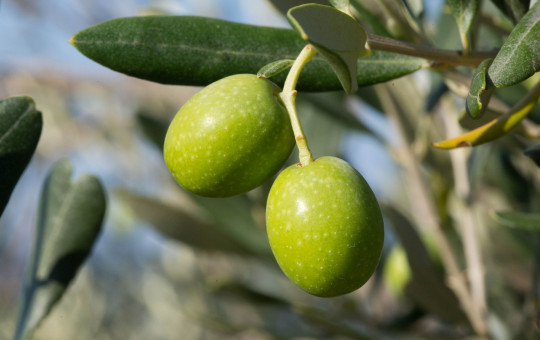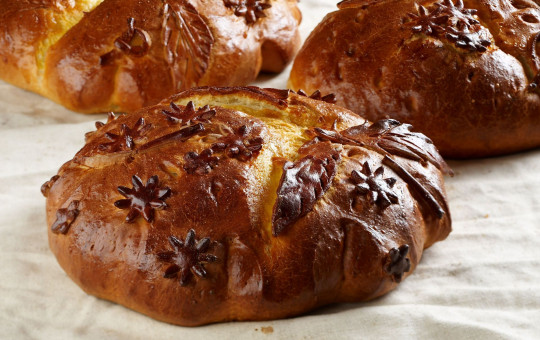Date: 8. May 2023
Time to read: 3 min
Karst – a region on the dreamy side of Slovenia – with its intense aroma of bora-dried prosciutto and intoxicating Teran wine, which draws its flavours from its red Karst terroir. Karst prosciutto (Kraški pršut) is a Slovenian culinary masterpiece. The typical rocky landscape of the classical Karst, with its diversified windy climate, provides natural conditions that the locals have skilfully learned to exploit for drying and curing meat. Such cured meats have built up their reputation due to their exceptional taste, top quality and excellent sensory qualities.
European quality symbol
Kraški pršut is labelled with the European quality symbol, the Protected Geographical Indication, which guarantees the quality and authenticity of the product. The protected geographical indication means that Karst prosciutto has a special quality, reputation and other distinctive characteristics and that it is produced solely in the strict region of the Karst. The border of the geographical area for the production of Karst prosciutto follows the geographical demarcation of the Karst itself. It runs from Kostanjevica na Krasu to Opatje Selo, from there to the state border with Italy and along the border to the Lipica border crossing, up to and including the village of Lokev and along the road to Divača, and from there in a straight line to the village Brestovica near Povirje, to the villages Štorje, Kazlje, Dobravlje, Ponikve, Kobdilj and after that in a straight line across Mali Dol to Škrbina in the direction of Lipa and Temnice back to Kostanjevica na Krasu.
-
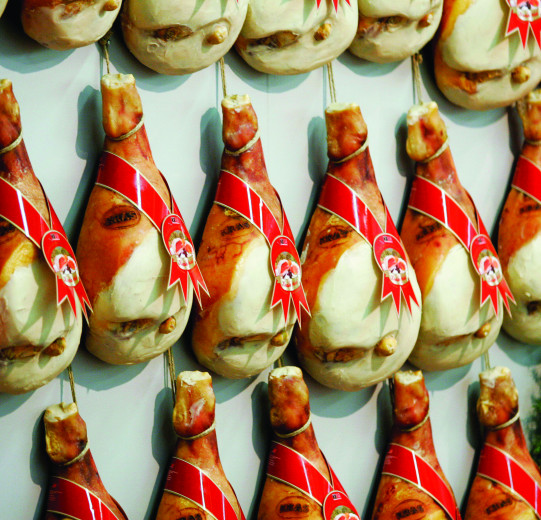 Kraški pršut has a special quality, reputation and other characteristic qualities and is produced exclusively in the immediate Karst region. Photo: Kras Sežana
Kraški pršut has a special quality, reputation and other characteristic qualities and is produced exclusively in the immediate Karst region. Photo: Kras Sežana
-
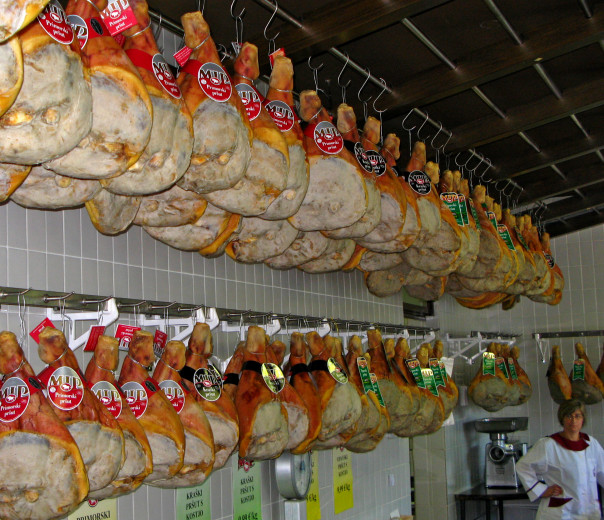 The producers of Karst prosciutto, organised in the EIG Kraški pršut , buy fresh pig legs in Slovenia and in other EU Member States. Photo: Kras Sežana
The producers of Karst prosciutto, organised in the EIG Kraški pršut , buy fresh pig legs in Slovenia and in other EU Member States. Photo: Kras Sežana
Proscuito production
The producers of Karst prosciutto, organised in the EIG Kraški pršut – Kras d.o.o., Pršutarna Lokev na Krasu and Raouber Kovačič Pršutarna from Dutovlje, buy fresh pig legs in Slovenia and in other EU Member States. The entire technological process, from salting to readying products for sale, is prescribed in detail. Fresh pork thighs (without the hocks) are modelled into their specific shape and chilled to between -1 °C and +4 °C. No more than 120 hours may pass between the pigs’ slaughter and the start of production. Fresh thighs are hot-branded with the date of production and the batch code to ensure traceability. Top-quality Karst prosciutto is known for the dry-salting process with sea salt. Salting is performed at temperatures of up to + 6 °C. Salting and initial drying at lower temperatures (up to +7 °C) mimic winter conditions. The longest and most important curing period is drying with simultaneous ageing. For lighter thighs, the entire production process takes at least 12 months; for heavier thighs, the time is extended accordingly.
During this time, the prosciutto's characteristic sensory qualities develop: colour, aroma, texture and eating quality. Drying and maturing take place at temperatures below 18 °C, which is why matured prosciuttos are rich in nutritional value and contain valuable proteins, vitamins and minerals. After the drying/maturing process, the sensory characteristics and physical and chemical parameters are tested. Finished products that meet the prescribed conditions are entitled to use the name Kraški pršut and are hot-branded with the Kraški pršut logo. In spite of modern technology, the traditional method of producing Karst prosciutto has been preserved in the Karst region, and the bora wind, which now and then blows very strongly, plays an important role in creating the unique taste.
-
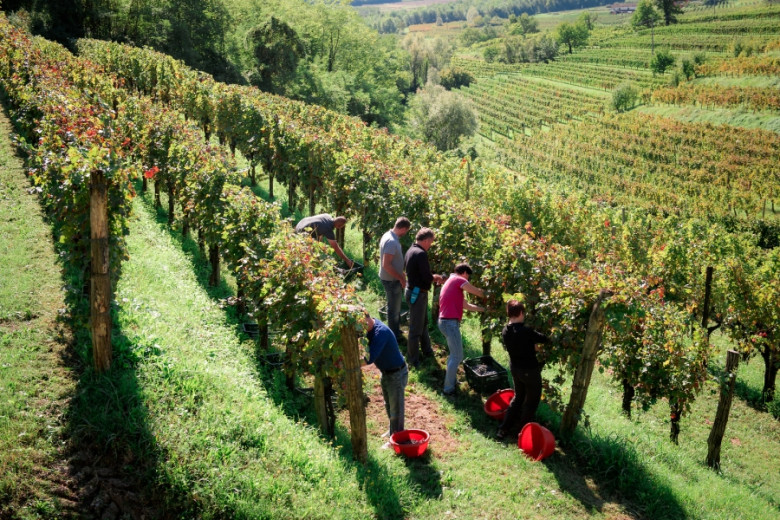 Teran is an indigenous Slovenian wine protected with recognised traditional denomination, produced from the grape variety called “refošk”. Photo: Ukom archives
Teran is an indigenous Slovenian wine protected with recognised traditional denomination, produced from the grape variety called “refošk”. Photo: Ukom archives
-
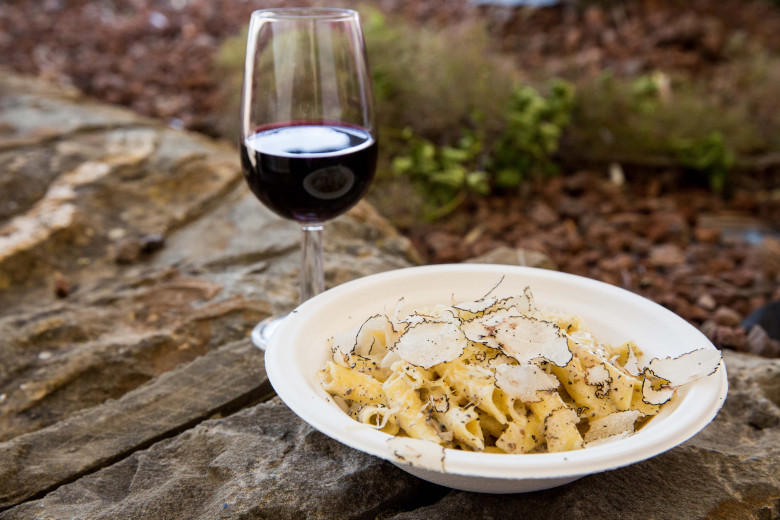 Teran is also considered to have more medicinal properties because it on average contains more polyphenols than other red wines. Photo: Ukom archives
Teran is also considered to have more medicinal properties because it on average contains more polyphenols than other red wines. Photo: Ukom archives
-
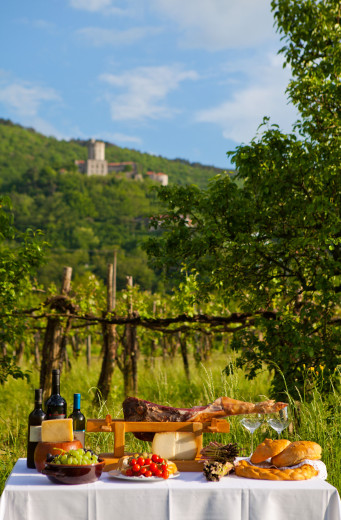 Teran can justly be proclaimed the King of the Karst, it is traditionally associated with Karst prosciutto. Photo: Ukom archives
Teran can justly be proclaimed the King of the Karst, it is traditionally associated with Karst prosciutto. Photo: Ukom archives
Teran – King of the Karst
Teran is an indigenous Slovenian wine protected with recognised traditional denomination, produced from the grape variety called “refošk”. Its qualities can be admired in its intense ruby red colour, its unique fruity aroma, fullness of flavour, high extract and a higher share of lactic acid than in other wines. Teran has a moderate alcohol level and slightly higher levels of total acids and lactic acid, which gives the wine its velvety softness. It is also considered to have more medicinal properties because it on average contains more polyphenols than other red wines. The high content of these natural antioxidants is partly a varietal characteristic and partly the result of traditional production methods. It can justly be proclaimed the King of the Karst. Teran is traditionally associated with Karst prosciutto. It is usually served with strong and spicy cheeses, salami, pancetta, red meat and game.
Another unique experience and an old secret of the Vipava and Karst regions are the so-called “osmice”, whose popularity has been constantly increasing among the locals and the visitors since the times of Maria Theresa when they were first introduced. In the 18th century, winegrowers and farmers were granted an 8-day licence (“osmica” means “the eight”) to sell their homemade beverages and other local delicacies tax-free. Today, these osmica events are held twice a year on every farm. They can be recognised by an ivy branch hung on the farmhouse or on signs placed along the routes leading to the farmhouse hosting an osmica from nearby towns.



